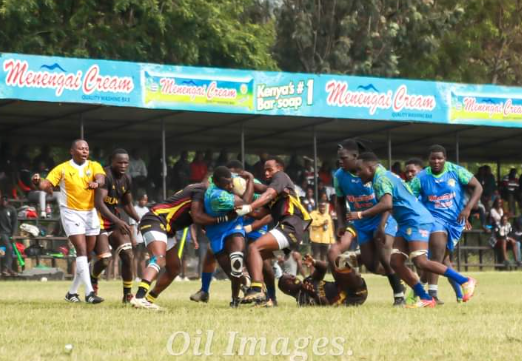In rugby, where grit meets grace, Colman Were’s story is a testament to determination, adaptability, and sheer passion.
From a tiny 13-year-old juggling drama and rugby to becoming a seasoned player with international caps, Colman’s journey is as compelling as the game itself.
Colman Were affair
Colman’s love affair with rugby began at Kakamega School in 2006. A Form One student with a warrior’s heart, he had spent his primary years excelling in soccer but sought a new challenge.

Colman Were in action for Nakuru RFC. PHOTO Colman Were
Rugby became his battlefield, though his early years were far from stellar. “In high school, I played all over the place; wing, centre, flanker, but never dominated to make it to the school team. I was that bad,” he recalls with humour.
Interestingly, Colman found solace in the drama club, particularly in dance. In 2007, his team clinched the dance finals, a moment of pride that still lingers. But rugby’s call was relentless. Training alongside the likes of Fabian Olando, Felix Ayange, and Martin Mukolwe, Colman found his footing, even if it meant enduring countless knocks and bruises.
Nakuru RFC journey
After high school, Colman joined Egerton University’s Town Campus, which placed him near Nakuru Rugby Club. Between lectures, he spent hours in the gym, lifting weights and honing his craft. Though he didn’t play much for Egerton, he immersed himself in Nakuru’s culture, a team he admired for their dominance.
From 2011 to 2017, Colman’s tenure at Nakuru was marked by triumphs, including a Kenya Cup title, a 10-aside trophy in 2015, the Mwamba Cup in 2016, and the Enterprise Cup in 2014. These victories weren’t just about trophies; they were about growth.
In 2017, Colman transitioned to Kabras Rugby Club, a move facilitated by forwards coach Anthony Ogot. Kabras not only offered him a contract but also secured a part-time job at the sugar company. Balancing work and rugby was gruelling, 5 a.m. gym sessions, full workdays, and evening maul but Colman thrived.
It was at Kabras that he earned his first call-up to the Kenya Simbas. His international debut came in Morocco, a tight game that Kenya won. “I remember taking the first tackle of the game. Their No. 8 and captain ran it ‘Vermeulen style.’ My shoulder was in shock for a good while,” he recalls.
EDITOR’S PICKS:
- Follow us on Scrummage Africa FB
- Mike Friday advice to Kenya 7s
- List of laws to be used in Kenya Cup 2024/25
- 1 step forward, 2 back: A story of Kenya Rugby Referees
After a two-and-a-half-year injury hiatus during the COVID-19 pandemic, Colman joined Menengai Oilers in 2021. Returning to where his club rugby journey began was both nostalgic and seamless. His most memorable moment with the Oilers came during the Kenya Cup finals against Kabras, where he scored a maul try, a personal victory despite the team’s loss.
Rugby, he says, has shaped his character as much as his career. “Rugby is not a contact sport; it’s a collision sport,” he asserts. Playing as a hooker, he mastered the art of dominating collisions and set pieces, skills he now imparts as a Level 1 World Rugby Strength and Conditioning coach.
Colman’s international highlights include topping tackle stats and ruck arrivals during the Repechage Tournament. Touring remains a cherished part of his career, with memories spanning Morocco, Namibia, South Africa, Romania, France, and even Uganda.
Now in the twilight of his playing days, Colman is channelling his experience into coaching. “I want to condition our players for the next level, the Rugby World Cup and the professional world of rugby,” he says. With over a decade in the forwards, he understands the nuances of the game like few others.
Colman Were target
The former hooker is currently working with Oilers and takes pride in the side ending their long wait for the Floodlit title. He attributes this success to their emphasis on physicality. He believes that improving physicality and conditioning can bridge the gap between them and top teams like KCB Rugby and champions Kabras RFC.
“We already have two trophies in the bag—the 2024 Floodies and the Rift Valley Betika 10s U23. Floodies, in particular, was interesting, with the Oilers showcasing their physicality. The Oilers have always been good ball players but often fell short in physicality, especially against Kabras and KCB in the latter stages of matches,” he said.

Colman Were in action for Menengai Oilers. PHOTO Colman Were
“I’m keen to address that. Rugby is evolving, not only in the skill and execution aspects of the game but also in its physical demands. Collision points are becoming more intense, and it’s crucial that coaches prepare athletes effectively. Rugby injuries can be devastating; depending on their severity, they can impact a player’s career and life beyond rugby. If my conditioning work can help reduce the need for doctors and physiotherapists, that’ll be a significant win,” he concluded.



